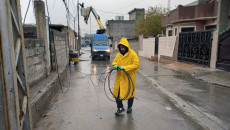The association of Kirkuk private generators has threatened to stop power supply in the entire province due to the transfer of the monthly state-subsidized diesel portion from the government to the private sector.
The Iraqi Ministry of Oil has decided to transfer the diesel supply for private generators from public to private stations causing protests among the owners of private, diesel, power generators and held a rally on Sunday, May 22, arguing the difference in price and quality while relevant authorities affirmed no change in the policy.
The protesters demanded the cancellation of the decision in front of the Kirkuk Oil Products Distribution Company.
"If the oil products continue to betray the owners of the generators, we will resort to turning off the generators throughout the province," Mohammed Khalil, president of the Kirkuk Private Generators Association, told KirkukNow.
The threat coincides with weather forecasts for rising temperatures and heavy sandstorms in the coming days.
“The government asks us for about 400 hours of electricity supply a month, while the diesel they deliver is enough for only 60-70 hours,” Khalil added.
"If the implementation of the ministry's decision continues, the price of an amp of generator is likely to reach 25,000 dinars," said the president of the association of private generators in Kirkuk.
Beside the national network of state-subsidized electricity supply all over Iraq, residential units and business projects rely on private generators for power supply to fill the gap of national power outage.
Following gulf war in 1991, the Iraqi state infrastructure was sharply hit by the economic embargo on Saddam Hussein regime due to damage of many transmission lines and substations leaving the basic services provided by the state inadequate.
Few years later, the local authorities gave permission to installation of private diesel generators in the residential neighborhoods to provide power and fill in the national power outages as it could provide only half of the demand on power supply.
The cost of the power provided by private generators is couple of times double of power provided by the state thus people are obliged to consume as less as possible during national power outage in order to pay less for private generators.
Video, May 2022: Kirkuk generator owners protest against a decision of the Iraqi Oil Ministry
The oil products distribution company has warned the owners of generators that they will receive their monthly diesel quota from private diesel stations from the beginning of June.
Salam Dilemi, a civil activist who attended the rally of the generators’ owners, thinks the decision of the Ministry of Oil and the warning of the generators is to the detriment of the citizens.
"We are in the midst of exams. What should be the situation of our students and what should happen to them?" Dilemi called on the oil ministry to reconsider its decision so as not to affect the increase in electricity prices.
Currently, the national power network provides 20 hours a day power to Kirkuk and the rest to be supplied by the private generators.
The government provides 10 liters of diesel per KVA monthly at 400 Iraqi dinars ($0.3) per liter, which is lower than the market price of more than 700 dinars per liter.
"The price of diesel will remain the same after being transferred to the private sector," a source in the Kirkuk Oil Products Distribution Company anonymously told KirkukNow.
He also said that meetings have been held with a number of generator owners and representatives of the generators’ association, to raise their request to the general office of the company for distribution of oil products, through them to ask the Ministry of Oil to discuss the request.
Kirkuk province needs more than 1,000 megawatts of electricity daily to provide electricity to the citizens, but receives less than half of that amount and relies on 733 private generators to fill the gap.
Located 238 kilometers north of Baghdad, Kirkuk is an ethnically mixed province for 1,7 million Kurds, Sunni and Shiite Arabs, and Turkmens. It has long been at the center of disputes between Baghdad and the Erbil.
Though the five oil wells of Kirkuk pump out about three million barrels of crude oil a month marketed for over 200 million American Dollars USD, the province misses proper utilities of power supply, drinking water, garbage collection, and basic healthcare and education system badly hurt by corruption and long years of war and instability.
Iraq's electricity ministry has cited a number of causes for the prolonged and widespread cuts including sabotage attacks, shortages of fuel for power stations, and the suspension of energy supplies from neighboring Iran.
Sabotage acts have lately found power transmission towers a hot target.
The Iraqi ministry of electricity said in a statement last August that 13 towers for transmission of power were damaged by the militants in 48 hours in Ninawa, Kirkuk and Salahaddin, including Kirkuk-Gayarra (in Mosul) by IED, causing damage to five towers.






